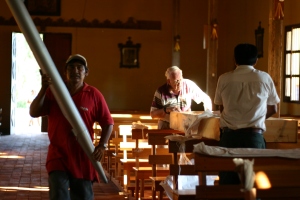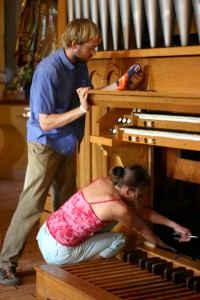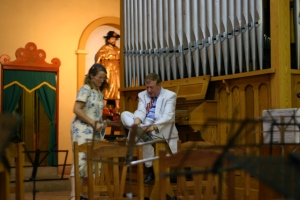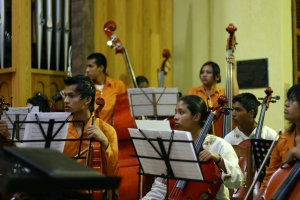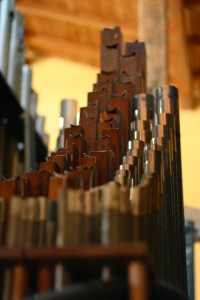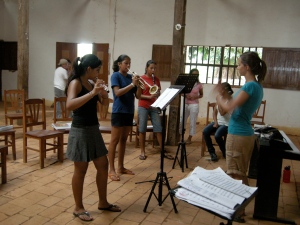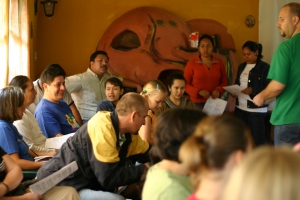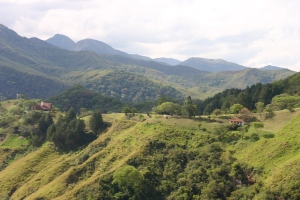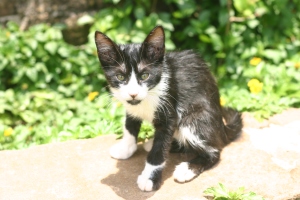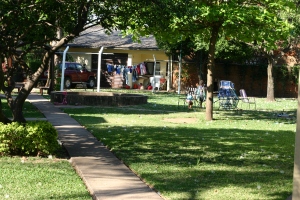I hardly know where to start describing this project that consumed my time for about the first month I was in Santiago.
Before I was even thinking about coming to Bolivia last year, Peter and Kathryn had started working on getting an organ from Earlham (they both graduated from Earlham) donated and sent to the Catholic church in Santiago. Peter came back to the US for SALT re-entry retreat and while visiting home in Indiana help pack up the organ at Earlham (these sites have his video of the process- http://www.univision.com/uv/video/Barckhoff-tracker-pipe-organ-to-Santiago/id/593132644 and http://www.youtube.com/user/wiggipe). About the time I got to Santiago, we had a little over a month to prepare for the big opening concert (Friday, October 30) for the organ with an amazing organist, Stephen Roberts, who was coming to play. So while Peter was in Santa Cruz trying to work out all the problems that the organ ran into trying to get to Bolivia, I stayed in Santiago to help Kathryn and the Organ Committee (a group of Santiageñas helping bring the organ) organize various things and get the choir and orchestra ready for the concert, while still learning Spanish and how to do my job.
During part of this time I took the train to Santa Cruz for the MCC retreat, and came back with Susan Tatershall who came to put the organ together.
Peter and Kathryn decided it would be really great to bring the Hombres Nuevos orchestra in Santa Cruz to play with our orchestra because they are a bigger and more established than our orchestra. So that they could play well together we got donations to take the Santiago orchestra to Santa Cruz to practice with Hombres Nuevos for a couple days. Their director Antoine Duhamel is an amazing and crazy musician (whose primary instrument is trombone) who spent much of his life working with the system of orchestras in Venezuela. About 4 years ago he decided to come work for SICOR in Bolivia and has directed Hombres Nuevos sinces then. Because I was directing a few of the pieces for the concert I rehearsed with Hombres Nuevos and the Santiago orchestra and was incredibly nervous to do so especially because I had absolutely no time or resources to help me prepare for conducting these pieces. Looking back, I know there are things that with experience and practice I could have done better, but I think things ended up going pretty well considering I was overwhelmingly busy, just a beginner at Spanish, and still learning how to work with string instruments. Also I felt crazy taking 16 students to a city of 1.5 million people with only two parents. Luckily nothing terrible happened and we all returned to Santiago for the concert.
While I took the orchestra to Santa Cruz, everyone in Santiago was waiting nervously for the organ to arrive. It should have come 3-4 weeks before the concert, but because of various shipping and customs problems in kept getting held up. Then about 3 days before the concert it arrived and Susie, Amado Cadena (a Bolivian organ builder and repairman-this is a pretty unique position because there are hardly any organs in Bolivia), and Peter began what was supposed to be a two week job of putting the organ back together. The final week before the concert, everyone involved in the project worked like crazy to get all the details put together, the organ in good enough shape to play, and the music sounding good because the Organ Committee had invited different important people from the local government and also people and organizations who had donated very much money to support the project. Finally on Friday night the concert began (all the organ parts were played by Stephen Roberts):
Concerto in G major, by Prins Johan Erns/J.S. Bach- for organ solo
Adagio en Sol Menor, by Giazotto/Albinoni- for organ with the Santiago and Hombres Nuevos orchestras
Concerto No. 3, by Pdr. Antonio Soler- an organ duet with Waldo Papo (an organ teacher in Urubicha, another Bolivian town who had been penpals with Stephen Roberts for several years)
Sonatas de Capilla, by W.A. Mozart- for organ with the Santiago and Hombres Nuevos orchestras
Praise the Lord with Drum and Cymbols, by Sigfrid Karg-Elert- for organ with an Hombres Nuevos brass ensemble
Ego Sum Panis Vivus, by Pdr. Giovanni Battista Martini- for organ and the Santiago choir
Trio for organ and trumpet- for organ and trumpet solo (a kid from Hombres Nuevos played this)
Concerto in G for Organ, Op. 4, by G.F. Handel- for organ with the Santiago and Hombres Nuevos orchestras
Variations on America, by Charles Ives- for solo organ
Leading up to the concert, I was incredibly nervous because it was my first ”real” concert that I conducted in (I directed two orchestra pieces and the choir piece). But overall I think it ended up going really well, and everyone was happy to relax after getting the organ in place and working.
Here are two articles (in Spanish) about the project:
–http://eldia.com.bo/index.php?cat=182&pla=3&id_articulo=18596
–http://www.eldeber.com.bo/2009/2009-10-18/vernotasantacruz.php?id=091017223407

